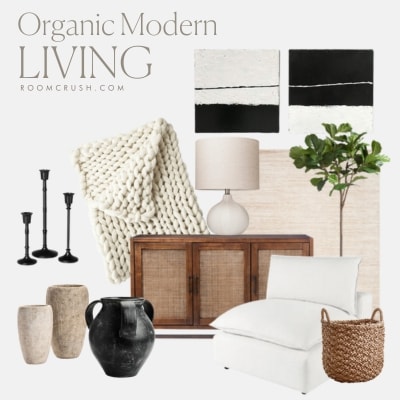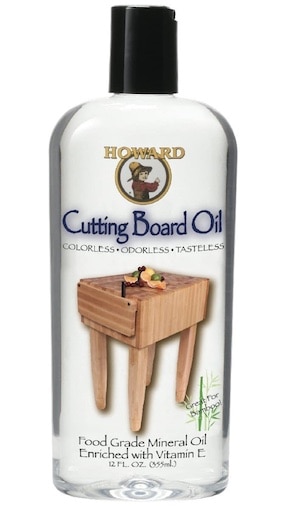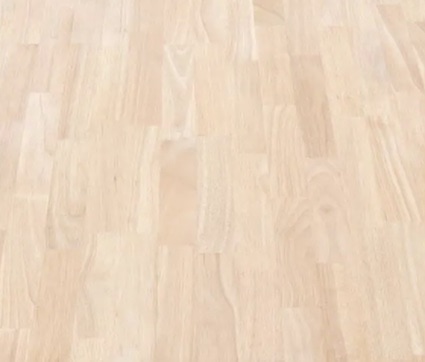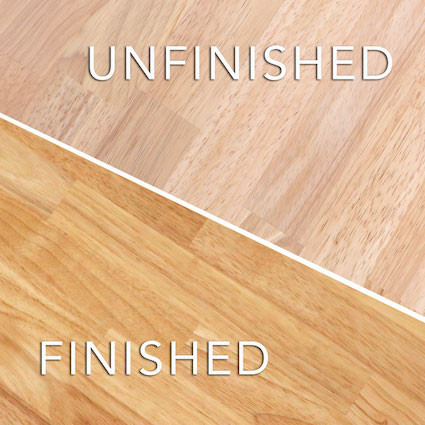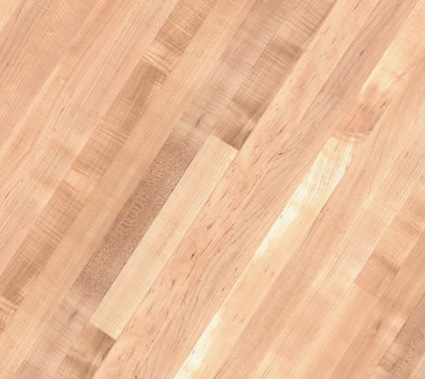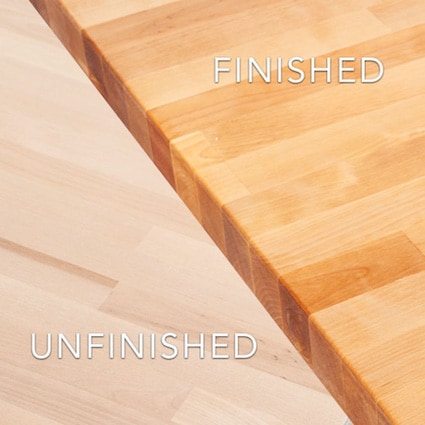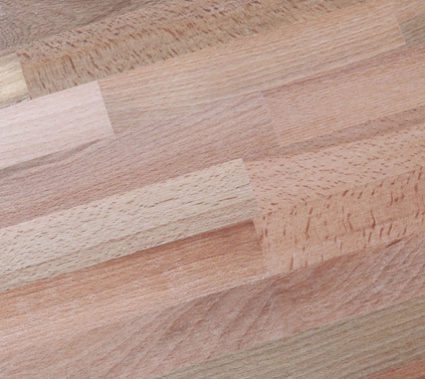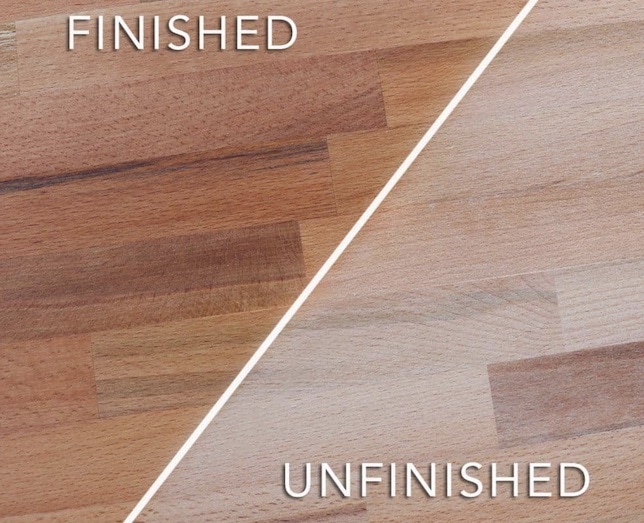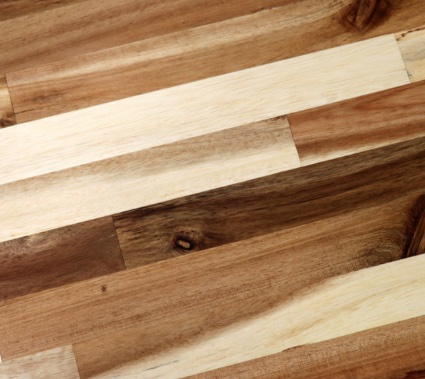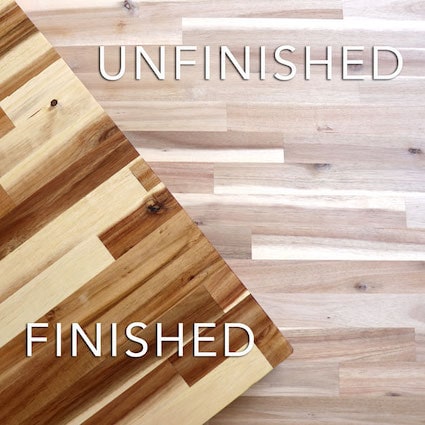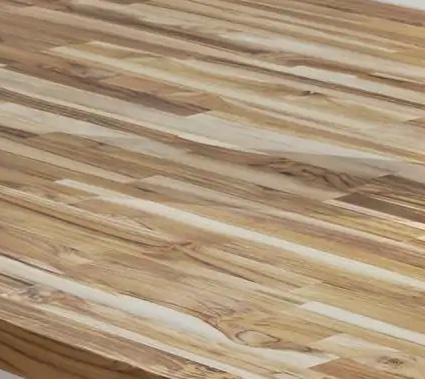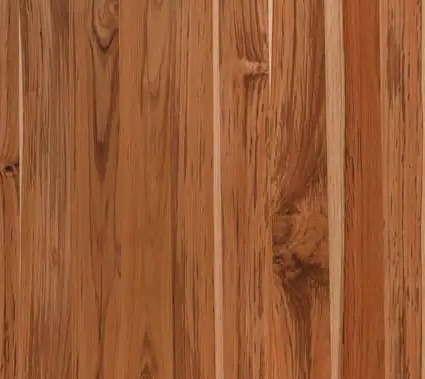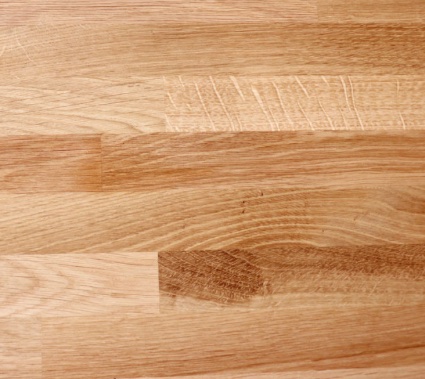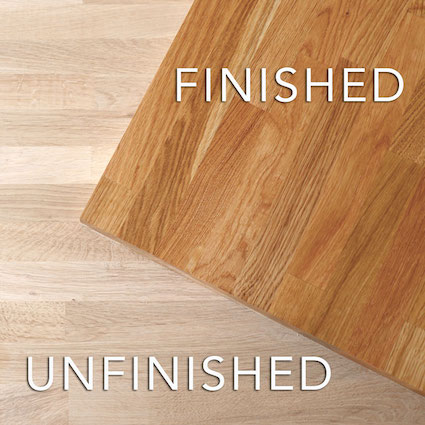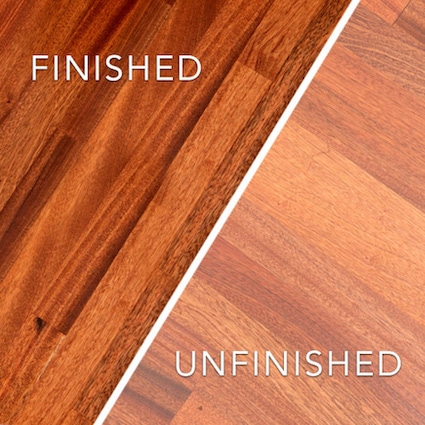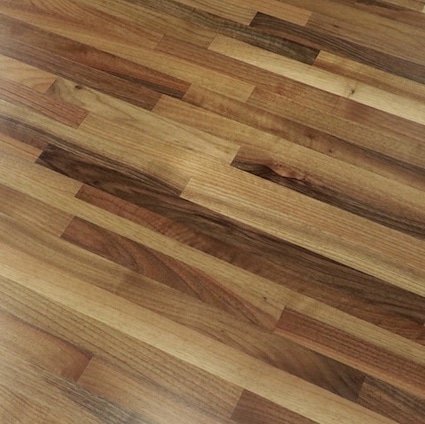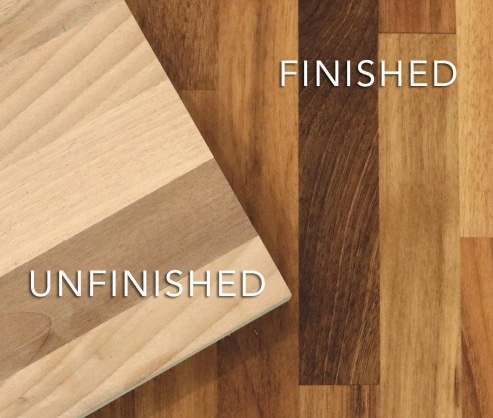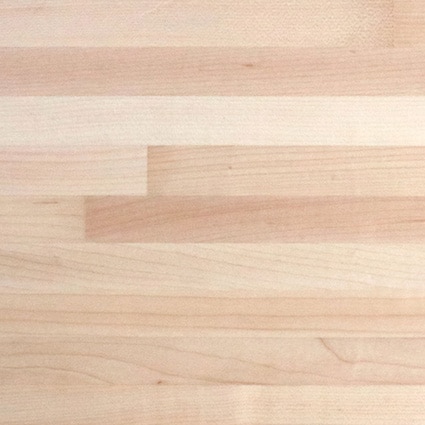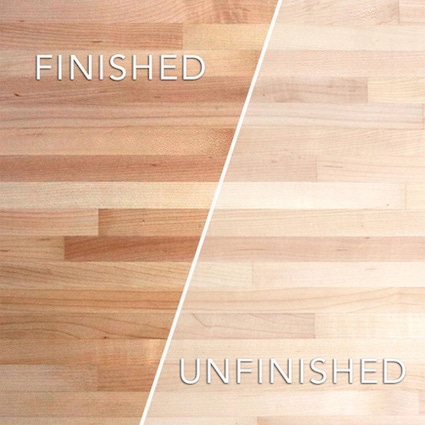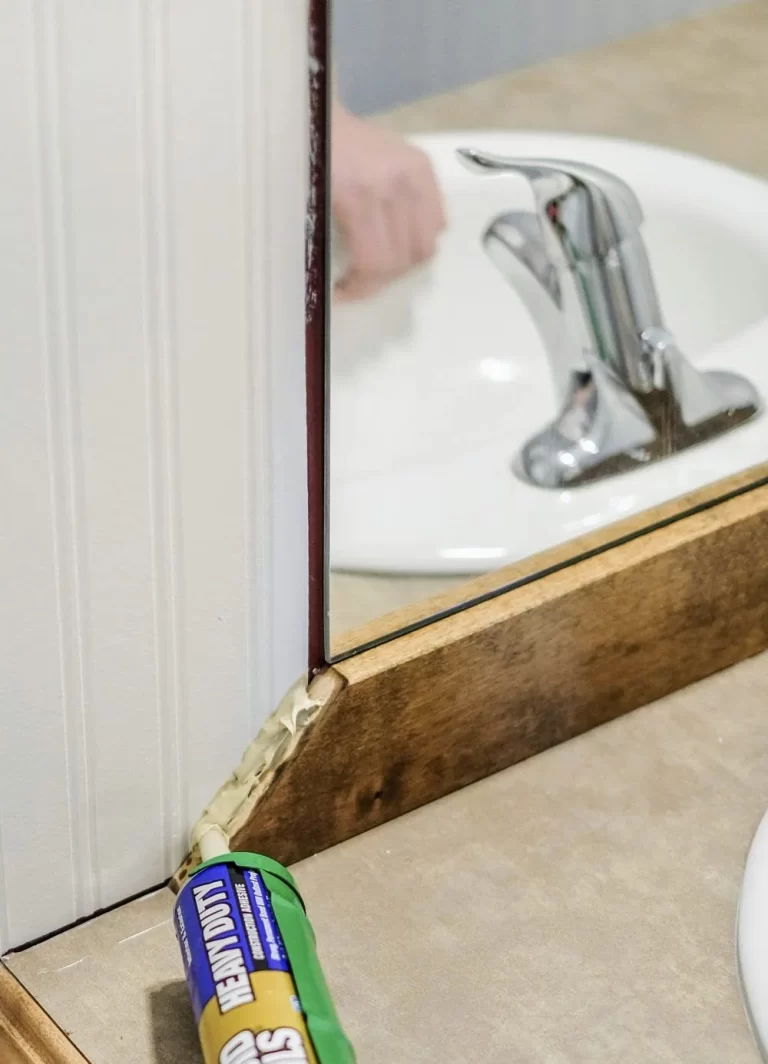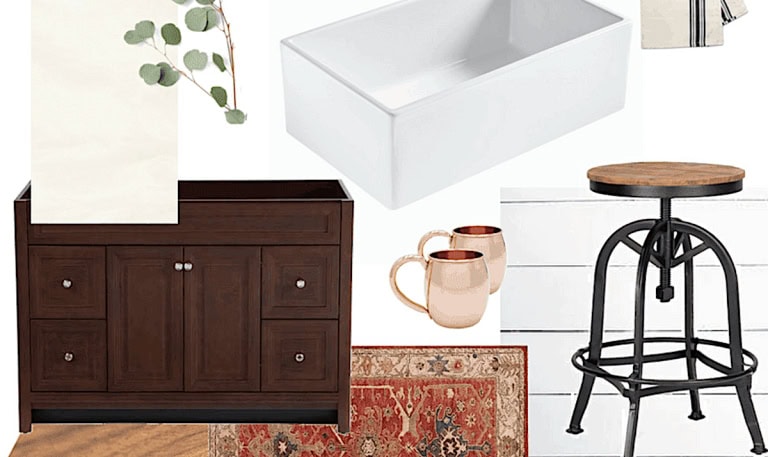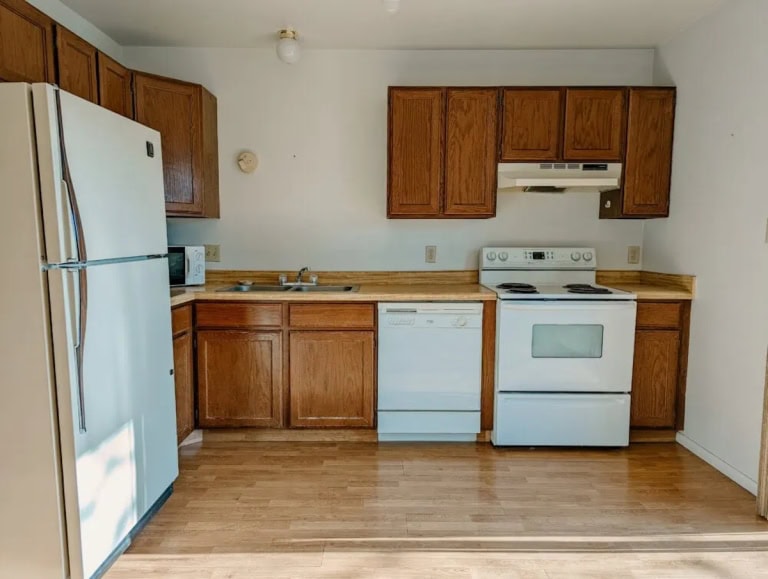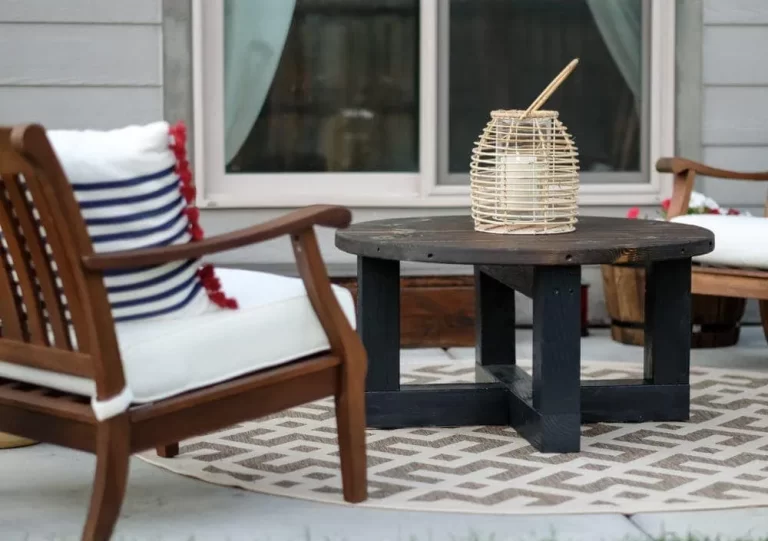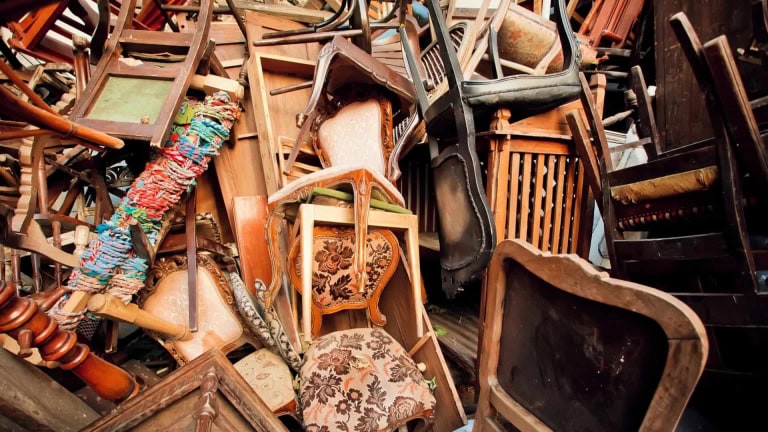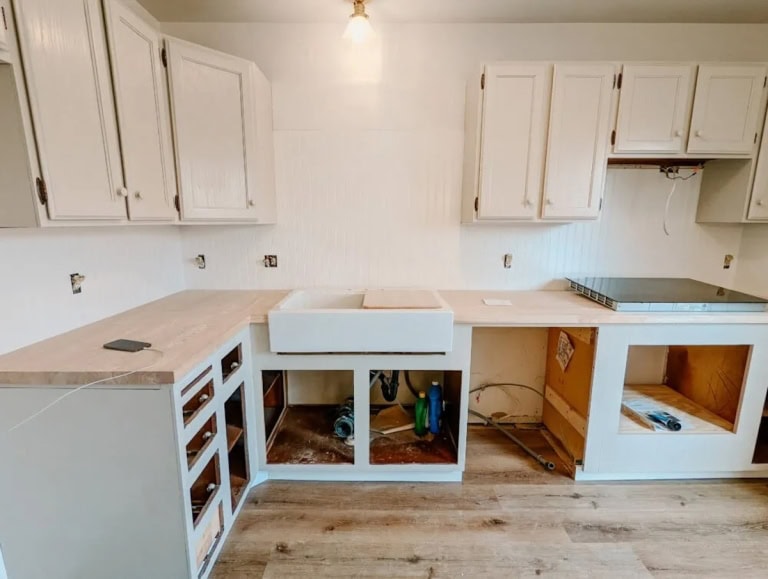Everything You Need To Know About Butcher Block Countertops
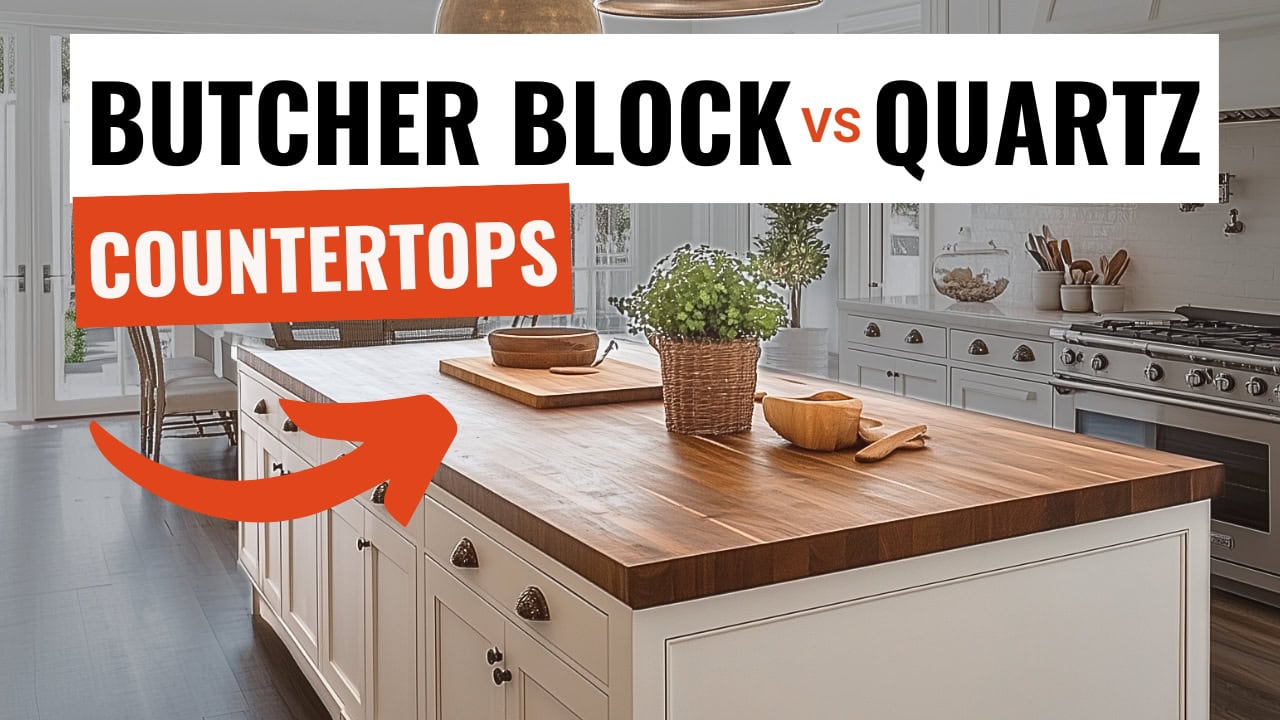
Butcher block countertops are beautiful, durable, inexpensive, and possible for DIYers to install themselves. Sounds too good to be true, right?
Keep reading to learn about all the pros (and cons) before deciding if butcher block countertops are right for your next project.
Is Butcher Block A Good Countertop Choice?
Yes! Butcher block countertops are a great option, especially for the price. These countertops are warm and inviting with their natural wood grains – and when sealed properly, they are extremely durable.
This site uses ads and affiliate content as an Amazon associate earning on qualifying purchases. Disclosure.
For a serial DIYer like myself, I love using butcher block!
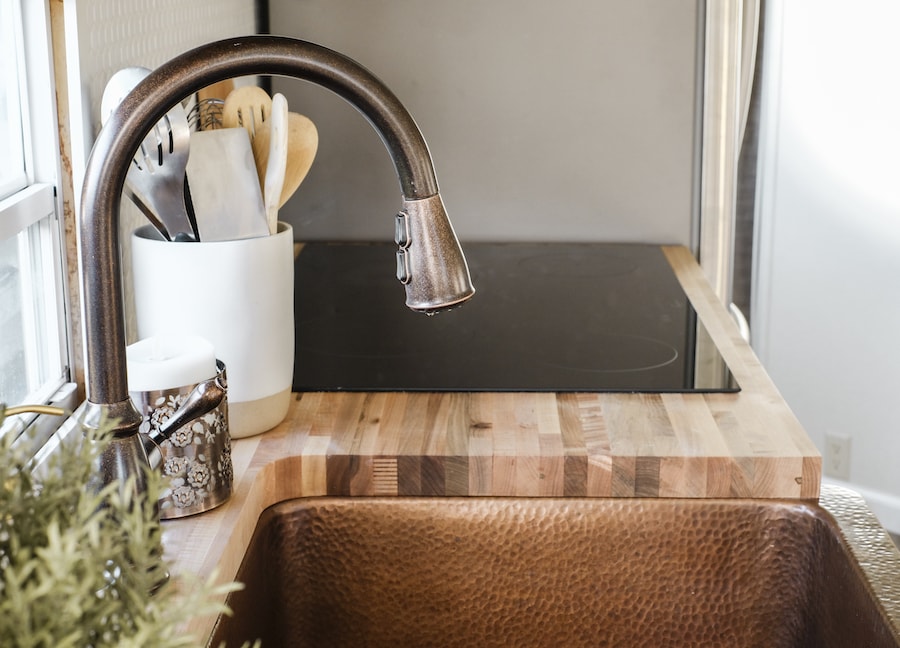
How durable are butcher block countertops?
Depending on the species of wood, and how they’re sealed, butcher block countertops are extremely durable, and waterproof.
If you go to your local Lowes or Home Depot, you’ll usually find some combination of Birch, Acacia, and Hevea butcher block countertops in stock. These are inexpensive hardwoods that strike an excellent balance between price and durability.
The image below is a butcher block made from Hevea. You can see some light scratching and denting from normal wear and tear.
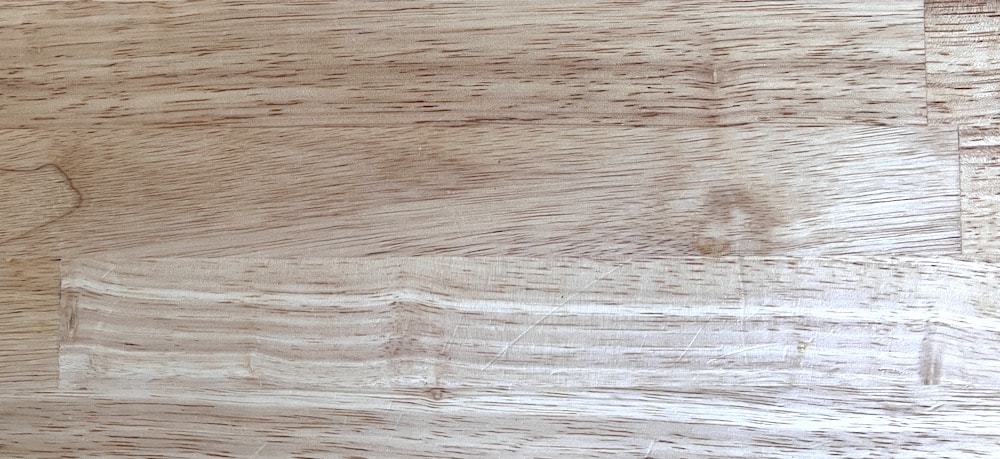
Wear like this is common, especially if you use your countertops like a normal person and don’t baby them all the time.
There are several exotic species of wood that are exceptionally durable. These are less likely to scratch, dent and wear over time. However, this extra durability comes with a heftier price tag.
What Are The ‘Cons’ Of Butcher Block Countertops?
Butcher block is softer than other popular countertop materials like granite and quartz. This makes it more susceptible to looking worn over time.
Although butcher block is softer than granite and quartz, it’s also less brittle.
If you accidentally slam a cast iron skillet onto a butcher block countertop, it’s going to leave a mark! It will most likely dent the wood, but it’s very unlikely to crack or break the countertop.
With the same cast iron skillet vs. granite or quartz countertops, they are more likely to crack, chip, or break.
Water And Stain Resistance
A properly sealed butcher block should have excellent water and stain resistance – but over the years as the finish becomes worn, water spots and staining can become a problem.
Butcher block is also less tolerant of heat than stone countertops. Make sure to use a trivet to protect the wood and sealant from hot frying pans or bakeware.
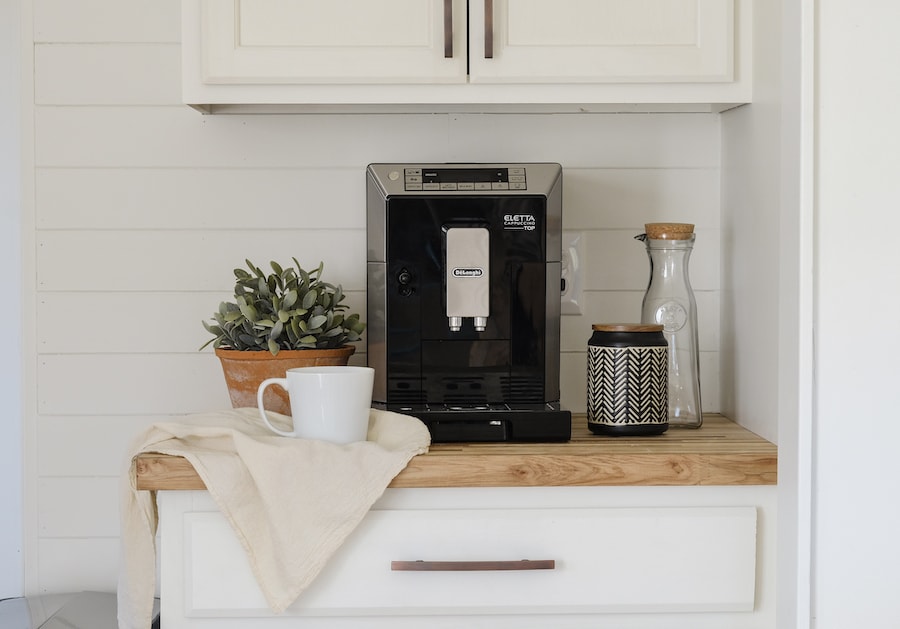
What type of sealant is best for Butcher Block Countertops?
I recommend sealing butcher block countertops with high gloss oil based spar urethane. This sealant will create the strongest, most durable, and most waterproof finish that will last for years.
Spar urethane is flexible enough that it won’t crack as the wood expands and contracts seasonally with temperature and humidity changes.
Spar urethane is highly resistant to moisture, so you won’t have to worry about water spots or staining.
If you’re a frequent user of harsh cleaning chemicals, then an oil based polyurethane would be a better choice – it has better chemical resistance.
Can You Cut on Butcher Block Countertops?
Yes, you can cut on butcher block countertops, but like any cutting board, it will show cut lines and wear.

If you plan to use butcher block as a cutting board, it should be conditioned with a food safe cutting board oil (and not sealed with urethane). Cutting board oil is made from food-grade mineral oil.
How Often Do I Need To Seal Butcher Block Countertops?
When a butcher block countertop is sealed with oil based spar urethane, this durable finish can last for many years, or even decades without needing to be refinished.
On the other hand, sealing butcher block countertops with a food safe cutting board oil will result in a less waterproof finish, and the wood will darken more quickly over time.
Using cutting board oil to seal butcher blocks will also require much more frequent maintenance. A fresh coat of oil should be reapplied infrequently to keep up the finish (roughly once a year depending on usage and conditions).
This isn’t necessarily a bad thing – it’s just a tradeoff you have to be willing to make if you want to use your countertops as a cutting board.
I have personally sealed butcher block countertops with both methods, and I would recommend using spar urethane for most people – especially with countertops near a sink!
If you love the idea of using your countertops as a cutting board, consider sealing all the main countertop areas with urethane, and having a separate island countertop that is used for food prep and cutting (and sealed with cutting board oil).
Keep in mind that the island will continue to darken over time, whereas the rest of the countertops will not.
Is Butcher Block Actually More Affordable?
Butcher block countertops are very budget friendly! They cost less than most other countertop materials.
In our latest remodel project, we installed Hevea butcher block countertops in a small kitchen. We used 33.33 square feet of countertop at a cost of $600 ($18 per square foot).
To account for the cost of sandpaper, sealant, mounting hardware, etc. I’ll round up and say the total installation cost was about $20 per square foot (not including my labor).
Is butcher block cheaper than granite and quartz?
Yes! Butcher block countertops are much cheaper than granite and quartz, especially when installing yourself as a DIY project.
Butcher block is also cheaper than solid surface countertops, porcelain, and sintered stone.
How Much Do Butcher Block Countertops Cost?
Installing butcher block countertops in an average size kitchen costs between $480 and $960 in materials depending on which type of wood you select.
For comparison, professionally installed granite or quartz countertops usually cost about $2,500 – $4,500 or more.
Here is how the cost of DIY butcher block compares to other types of countertops:
- Butcher Block: $16 – $32 per square foot (materials cost only)
- Granite: $66 – $139 per square foot (installed price)
- Quartz: $75 – $126 per square foot (installed price)
- Solid Surface: $55 – $73 per square foot (installed price)
- Custom Laminate: $30 – $36 per square foot (installed price)
- Pre-fabricated Laminate: ~$10 per square foot (materials only)
- Porcelain: $76 – $96 per square foot (installed price)
- Sintered Stone: $91 – $121 per square foot (installed price)
These cost estimates were obtained from my local Lowe’s home improvement store. Costs may vary widely in different regions or with different stores, but this information is helpful for the sake of comparison between countertop types.
Can You Install Butcher Block Countertops Yourself?
Yes! Installing and sealing butcher block countertops is a job that can be handed by a competent DIYer. The hardest part of the installation is joining two piece of butcher block together in a corner – especially if the walls aren’t exactly 90 degrees.
The job can be accomplished with only a few power tools:

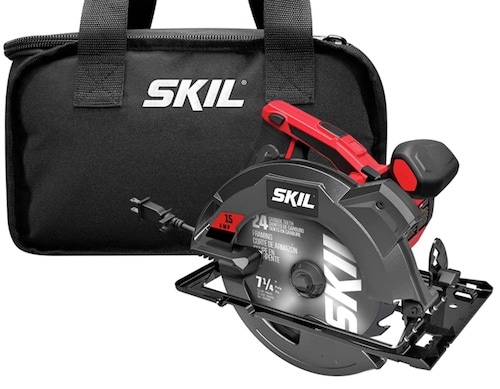
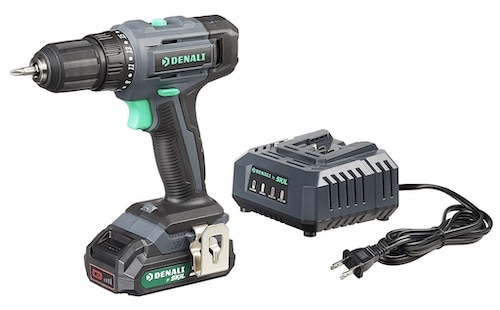
Where Can You Buy Butcher Block Countertops?
Butcher block countertops are available for purchase at most home improvement warehouse stores, lumber stores, and custom kitchen cabinetry & countertop stores.
Stores like this usually stock a limited selection of common butcher blocks. Because of this, I like to order my butcher block countertops online through The Home Depot so I can get exactly what I want.
The Home Depot online has an excellent selection of unfinished butcher block countertops, and shipping to your local store is always free.
When you purchase unfinished countertops, they’re cheaper, and it’s pretty easy to sand and seal them yourself. However, most butcher blocks also have to option to purchase pre-finished.
I’ve used these Unfinished Birch Solid Wood Butcher Blocks from The Home Depot, and they were excellent quality, especially for being so cheap! I would definitely recommend them.
What Are The Different Types Of Butcher Block?
Butcher block countertops can be made from any type of wood – because of this, there are a ton of different options! The main differences are in appearance, durability, and price.

Different species of wood have unique color and wood grain patterns. No two butcher blocks will look exactly the same because there are always color and pattern variations, even in wood from the same tree.
Below are the most commonly available types of butcher blocks, ordered from least expensive, to most expensive (at the time of writing).
Sealing a butcher block countertop will change the appearance. In the images below, I’ve included unfinished, and finished butcher blocks. The exact appearance of your countertops will depend on what type of finish you use, and the specific piece of wood you receive.
Hevea Butcher Block Countertops
Hevea stems from the maple family of trees. It’s a tough and durable species of hardwood that is know for its density.
I’ve personally done a kitchen remodel using Hevea butcher blocks, and I would recommend it! It is affordable, looks great, and holds up really well.
Unfinished Hevea Butcher Block
Birch Butcher Block Countertops
Birch is one of the most popular butcher block countertops in the world. It is a slow-growth, close grain hardwood.
Butcher blocks made of birch have very good durability at an affordable price point. It’s another species of butcher block that I have personal experience with, and it’s a great choice.
Beech Butcher Block Countertops
Beech is a medium to heavyweight wood that is strong, and highly abrasion resistant. It has straight grains, and a pale creamy pink appearance. Beech butcher blocks are an excellent value.
Hevea, Birch, and Beech all cost about the same, and have similar durability. The choice between these three comes down solely to appearance.
Unfinished Beech Butcher Block
Acacia Butcher Block Countertops
Acacia countertops are beautiful, durable, and economical. Acacia wood is well know for being easy sand and finish.
The wood grains and colors of Acacia wood are bold with a strong contrast between light and dark piece of wood.
Unfinished Acacia Butcher Block
Teak Butcher Block Countertops
Teak has been a coveted wood for millennia. It was the wood of choice for building ships! As you could imagine, teak has excellent durability and natural water resistance.
The price of butcher blocks made from teak is near the middle of the pack, but the durability rivals more expensive types of wood.
The appearance of teak butcher block can vary widely from light, to very dark, or contrasted with light and dark.
Dark Color Teak Butcher Block (Finished)
Oak Butcher Block Countertops
Oak is an extremely durable wood that if taken care of properly, will last for generations!
Of the types of wood on this list, the durability of oak butcher blocks are second only to maple. However, oak is much cheaper making it a stellar value.
Sapele Butcher Block Countertops
Sapele is a lesser-known type of hardwood that originates from Africa. It has interlocked grains, and a rich dark red brownish color.
Butcher blocks made of sapele wood have exceptional natural durability and an exotic appearance.
Unfinished Sapele Butcher Block
Walnut Butcher Block Countertops
Walnut is renowned for its rich dark brown color, and it has been one of the most highly sought after hardwoods throughout all of history.
If you love the look of walnut, then nothing else comes close! Walnut is extremely durable, but it’s one of the more expensive types of butcher blocks.
Unfinished Walnut Butcher Block
Maple Butcher Block Countertops
If you want the most durable butcher block, and your budget is less price sensitive, go with maple! It’s extremely hard and more durable than all the other types of butcher block countertops on this list.
Maple has a light, uniform color, with mostly straight grain patterns. It’s a true classic, and always a good choice.
Unfinished Maple Butcher Block
Thanks for reading! Let me know in the comments if you have any more questions about butcher block countertops.
All You Need To Know About Butcher Block
